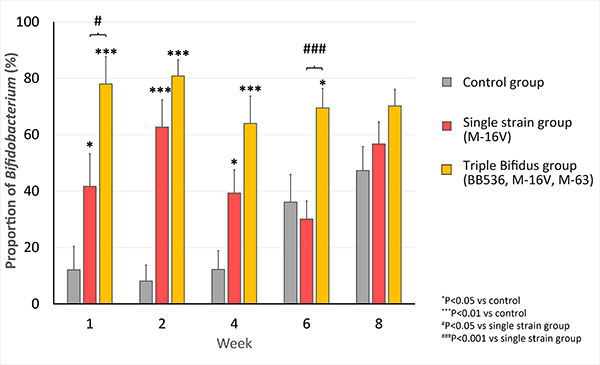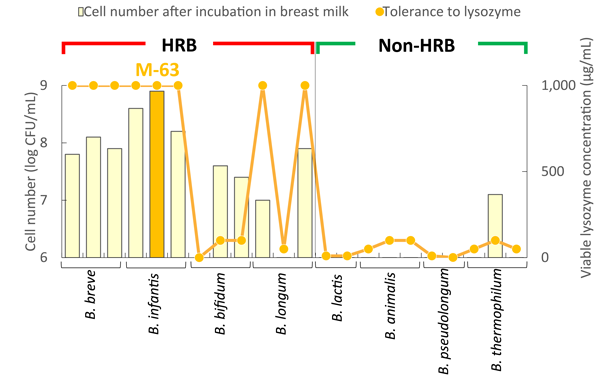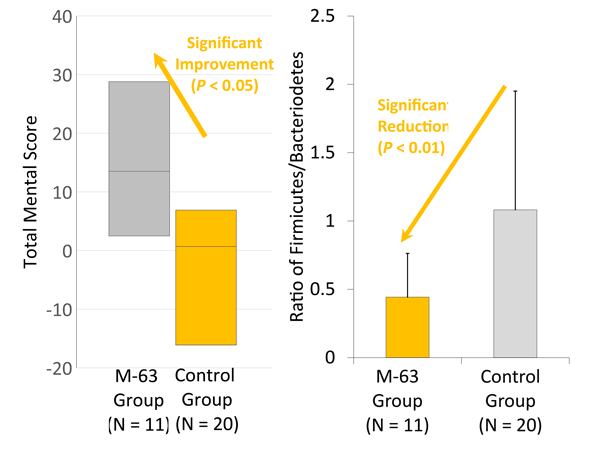Clinical Efficacy
M-63: Superior Potential for Infant Use
M-63 enhanced bifidobacterial colonization in low birth weight infants

Colonization by commensal bifidobacteria during early life is indispensable for the normal development and growth of the gastrointestinal tract, particularly for epithelial barrier function and mucosal immunity. A high abundance of bifidobacteria may contribute to improved health status and protect premature infants from diseases.
In 44 low birth weight infants (body weight 1000-2000 g), who were ready for feeds within several days of birth, administration of either a single strain of M-16V (0.5 billion CFU/day) or triple strains probiotic mixture containing BB536, M-16V and M-63 (0.5 billion CFU/day each strain) for six weeks resulted in a significant increase in the detection rates and cell numbers of bifidobacteria in the feces[1].
Importantly, the triple strains probiotic mixture containing BB536, M-16V and M-63 tied to an earlier formation of a bifidobacteria-dominant microbiota and a significantly lower level of Enterobacteriaceae than those administered with M-16V alone and control group.
The results suggest that M-63 may confer an additive effect when combined with other bifidobacterial strains, for which M-63 enhanced the beneficial effects of other bifidobacterial strains.
Reference:
- 1Ishizeki, S., Sugita, M., Takata, M. and Yaeshima, T., 2013. Effect of administration of bifidobacteria on intestinal microbiota in low-birth-weight infants and transition of administered bifidobacteria: a comparison between one-species and three-species administration. Anaerobe, 23, pp.38-44.
HMOs utilization capability of M-63

Human milk is recognized as the gold standard for human infant nutrition. It fosters not only the growth of the infant, but also to shape the infant gut microbiome with life-long impact via complex human milk oligosaccharides (HMOs). M-63 is superior to many gut bacteria in its immense capacity to utilize HMOs.
In an in vitro study[1] assessing the ability of different bifidobacterial species or subspecies to grow in human breast milk, M-63 exhibited unique efficiency in HMOs utilization and grew well in human breast milk as compared to most other commensal bifidobacterial strains.
These findings indicate that M-63 is highly compatible with human breast milk - a natural source of nutrition for infants - and therefore; possesses superior potential to colonize and adapt to the intestinal environment of humans, especially infants.
Reference:
- 1Thongaram, T., Hoeflinger, J.L., Chow, J. and Miller, M.J., 2017. Human milk oligosaccharide consumption by probiotic and human-associated bifidobacteria and lactobacilli. Journal of Dairy Science, 100(10), pp.7825-7833.
M-63 improves mental state in subjects with irritable bowel syndrome

M-63 not only possesses superior potential for infant use but may also help to boost mental health in adults with irritable bowel syndrome (IBS). Recent research[1] shows that consumption of M-63 improved the mental state of victims of the disastrous flood in Malaysia. In December 2014, one of the worst floods in decades hit Malaysia. During floods, poor environmental hygiene leads to exposure to elevated levels of pathogenic bacteria, which is known to cause digestive illness and lead to additional physical as well as psychological problems.
In a clinical trial performed between September and December 2015, 11 adults with IBS were supplemented with M-63 powder for three months (M-63 intake group) while 20 victims without digestive difficulties who did not take bifidobacteria were served as controls.
Consumption of M-63 better improved the mental well-being of victims who developed IBS after floods. M-63 also restored gut microbial balance in the victims and that the improvement of mental state is probably related to the changes in gut microbiota.
Reference:
- 1Ma, Z.F., Yusof, N., Hamid, N., Lawenko, R.M., Mohammad, W.W., Liong, M.T., Sugahara, H., Odamaki, T., Xiao, J. and Lee, Y.Y., 2019. Bifidobacterium infantis M-63 improves mental health in victims with irritable bowel syndrome developed after a major flood disaster. Beneficial Microbes, 10(2), pp.111-120.
